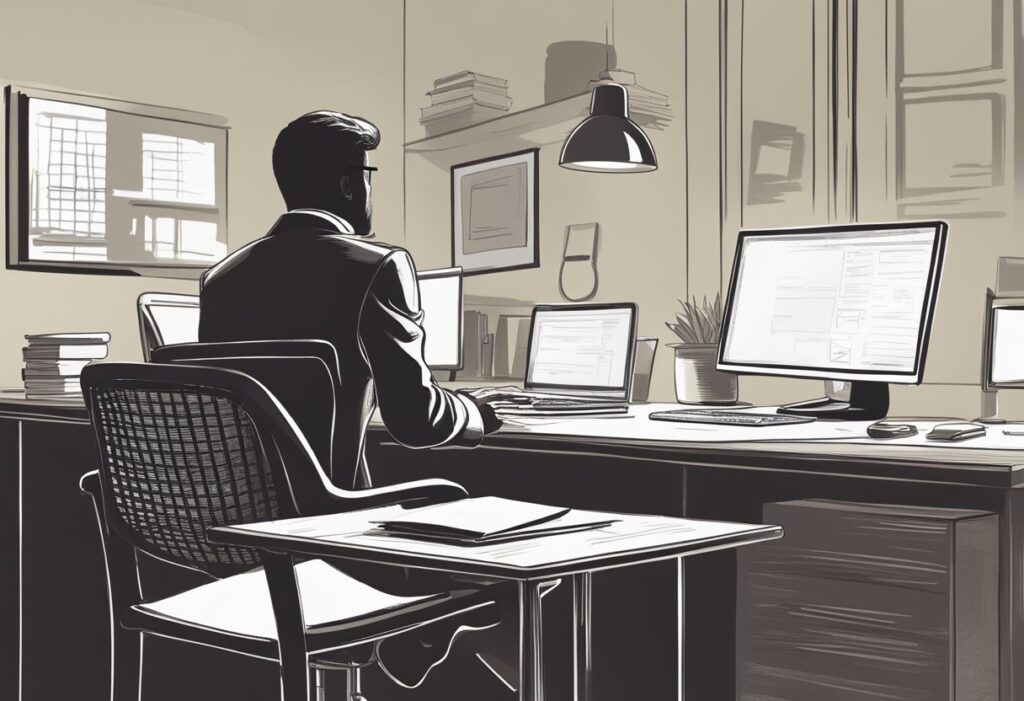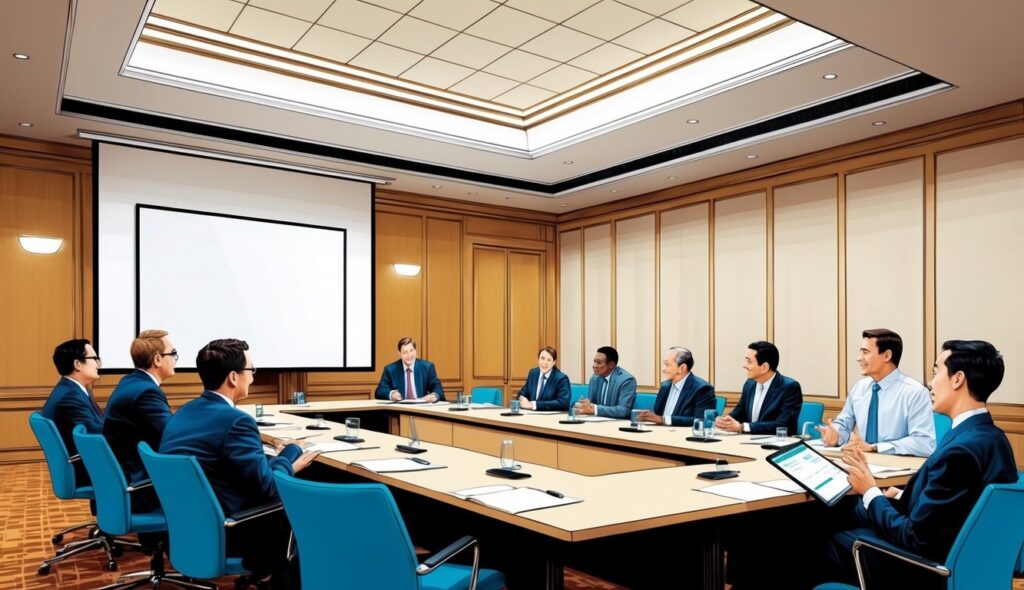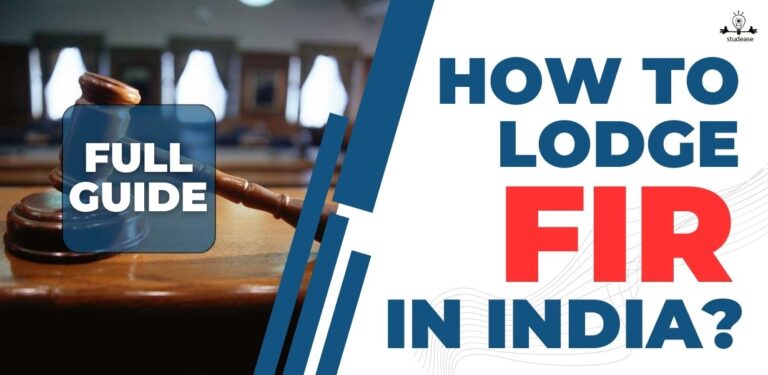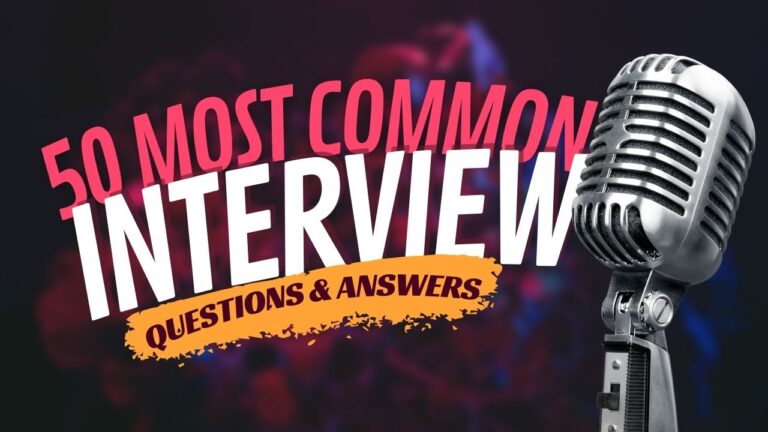Panel Interviews: Tips & Strategies for Success in Your Career Journey

Attending a panel interview can be intimidating, but with proper preparation, you can approach it with confidence. The key to succeeding in a panel interview is preparation and practice. This post covers Tips & Strategies for Success in Your Career Journey.
Make sure to research each panel member so you can address their potential questions or concerns effectively.

During the interview, stay calm and composed. Maintain eye contact with the person asking the question, but remember to engage with others on the panel too. This way, you show that you’re attentive and keen to connect with everyone.
Participate actively without dominating the conversation. Listen carefully to each panel member and respond thoughtfully. By balancing speaking and listening, you demonstrate respect and professionalism.
Understanding Panel Interviews

Panel interviews involve a group of interviewers meeting with a candidate. This setup allows multiple perspectives and helps assess candidates on various skills and cultural fit aspects.
Defining a Panel Interview
In a panel interview, a candidate faces several interviewers at once. This format helps gather candid insights from various team members and decision-makers.
Each interviewer brings unique perspectives, often focusing on different skills or qualities. Decision-makers might assess leadership potential while team members look for collaboration skills.
Panel interviews often reflect a company’s emphasis on teamwork. They test how you handle real-world communication scenarios with diverse personalities. It’s also a more efficient way to evaluate cultural fit, providing insight into how you interact with multiple stakeholders.
Interviewers usually include those who work closely with the role or have a strong understanding of the company culture.
Roles of Interviewers
Each interviewer often takes on specific roles during the panel interview.
Role Assessor: Evaluates technical skills or job-specific knowledge. Cultural Ambassador: Observes how well you might fit within the company culture. Behavior Analyst: Focuses on your soft skills like problem-solving and teamwork.
Interviewers work together to form a complete picture of your fit for the role.
Some might prioritize your professional background, while others may explore how your personality aligns with the company’s values and team dynamics.
Understanding these roles helps you tailor responses to meet different expectations. This multi-faceted approach aims to ensure that you’re not only technically capable but also a great match for the team and the broader organization.
Preparation Strategies for Panel Interview

Mastering a panel interview involves researching the company and interviewers, anticipating common questions, and developing structured responses. Focus on understanding the company culture and crafting thoughtful answers using techniques.
Researching Company and Interviewers
Begin with a thorough investigation of the company. Visit their official website and review their mission, values, and recent news.
Understand the company’s products, services, and industry position. This helps you tailor your responses to align with their goals.
Learn about the interviewers. Lookup their professional profiles on platforms like LinkedIn to get insights into their roles and interests. This will help you establish a connection during the interview.
Being informed about your interviewers’ backgrounds can also guide you in formulating relevant questions.
Anticipating Common Panel Interview Questions
Prepare for common panel interview questions by understanding the job description. Identify key skills and responsibilities mentioned.
Practice answering typical questions like, “Tell us about yourself,” or “Why are you interested in this position?” Use your knowledge of the company to show how your skills meet their needs.
Expect questions about teamwork and problem-solving. Frame your responses to demonstrate how you handle real-life work challenges.
Think of examples that show leadership, conflict resolution, and initiative.
Developing Structured Responses
Use structured answers that include the context, your role, actions taken, and the outcome. Structuring responses helps you stay concise and focused.
Prepare responses that highlight your skills and achievements. Think about the impact you had in previous roles.
Anticipate questions about your experience and practice delivering clear, confident answers. Rehearse to ensure smooth delivery during the actual interview.
Developing clear and structured answers will make you stand out to the hiring manager and panel.
Interview Techniques for Panel Interview

Focus on how you communicate, solve problems, and show adaptability. Preparation and clarity in these areas will set you apart.
Effective Communication Skills
Good communication is key in any interview. Speak clearly and concisely. Use polite language and maintain eye contact with each panel member. This shows confidence and respect.
Interpersonal skills are also important; relate your answers to each panelist’s expertise when possible.
Showcasing Problem-Solving Abilities
Panels often want to see your problem-solving abilities. Think aloud as you solve problems to show your thought process. Use real-life examples to highlight successful outcomes.
Describe situations where you faced challenges and the steps you took to overcome them. Practice behavioral questions related to problem-solving.
Demonstrating Adaptability and Teamwork
Adaptability is valued in rapidly changing environments. Share stories of how you adjusted to change. Highlight times when you learned a new skill or adapted to a new role.
Show you can work well with others. Discuss experiences where teamwork skills made a project successful. Briefly explain challenges faced in a team setting and how you contributed positively to the outcome without over-complicating the story.
Managing First Impressions
First impressions count. Dress appropriately for the company culture, keeping it professional. Arrive on time and greet each panel member with a firm handshake and smile.
Positive body language helps set a good tone from the start, reinforcing your verbal communication. Be polite and express gratitude for the opportunity. Small courtesies can go a long way in establishing a strong beginning to your interview.
Handling Unexpected Questions
Panel interviews may include unexpected questions. Stay calm and take a moment to think before you respond. It’s okay to ask for clarification if needed.
Answer honestly but stay positive. If you don’t know the answer, admit it and focus on your ability to learn quickly. Highlight your reasoning and decision-making process to show resourcefulness and poise under pressure.
Navigating Situational and Technical Questions
Prepare for situational and technical questions. These aim to explore your reactions and expertise in specific scenarios. Practice by answering sample questions related to your field.
For situational questions, use real examples from your past experience. In technical questions, demonstrate your knowledge clearly and accurately, explaining concepts without overly complex jargon, making it understandable for all panelists involved.
Leveraging Your Professional Background
Use your professional background to your advantage. Tailor your answers to reflect your experience. Highlight major achievements that are relevant to the position.
Discuss roles or projects that relate to the job you’re applying for. Connect your past experiences with the needs of the company. This shows not just competence, but how your history makes you uniquely suited for the position.
Beyond the Interview Process

Confidence in your skills and strategies can make a real difference in panel interviews. Understanding how decisions are made afterward can give you insights into what happens next.
Understanding the Decision-Making Process
After a panel interview, many people have a role in deciding who gets hired. Decision-makers include people like managers and team leads who consider your fit for the job. They look at your interviewing skills and how well you might handle tasks like those in project management.
An HR representative often plays a part, too. They focus on your expected culture fit and qualifications. Each member of the panel will bring their own views to the table.
Courses on project management or interview strategies can strengthen your skills. This can ensure that you leave a positive lasting impression beyond the interview itself.
Frequently Asked Questions: Tips for Panel Interview

In a panel interview, preparation is key, whether in-person or via Zoom. Standing out involves both confidence and strategic answers.
How should one prepare for a panel interview conducted via Zoom?
Ensure your technology is ready. Check your internet connection, camera, and sound. Find a quiet, well-lit space where you won’t be interrupted.
Dress professionally, as you would for any interview. Familiarize yourself with the Zoom platform to navigate it easily during the interview.
What strategies can help an individual stand out during a panel interview?
Research each panelist and the company. Mention specifics that relate to their roles or interests. Prepare to speak clearly and offer examples to back your responses.
Show enthusiasm and ask insightful questions. Maintain good eye contact, addressing each panelist equally.
Can you provide five key tips for a successful job interview?
- Research the company and the role thoroughly.
- Practice common interview questions and tailor your answers.
- Show up on time and dress appropriately.
- Communicate clearly and confidently.
- Follow up with a thank-you email to express appreciation.
How does one demonstrate confidence and handle the pressure in a panel interview setting?
Stand or sit up straight, maintain eye contact, and speak slowly. Practice deep breathing to stay calm. Have a list of key points you want to make.
If you don’t know an answer, it’s okay to take a moment to think or ask for clarification.
What is a panel interview and how does it differ from traditional one-on-one interviews?
A panel interview involves multiple interviewers instead of just one. It allows different team members to assess your qualifications simultaneously.
You’ll answer questions from several people, offering a range of perspectives. It can be more dynamic, requiring you to engage with multiple personalities at once.
All the Best !






